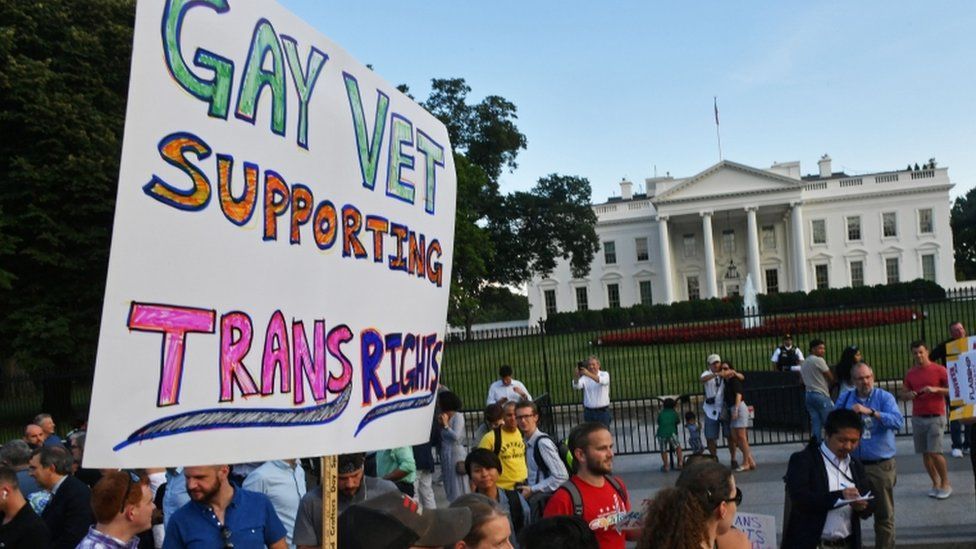Is Trump's Transgender Military Ban Fair? An Objective Assessment

Table of Contents
The Arguments For the Transgender Military Ban
Proponents of the ban often base their arguments on concerns about military readiness and perceived disruptions to unit cohesion.
Concerns about Military Readiness and Costs
Arguments supporting the ban frequently cite potential impacts on military readiness. These concerns often center on:
- Increased healthcare costs: The argument is made that providing healthcare for transgender service members, including gender confirmation surgeries and hormone therapy, would place an undue financial burden on the military.
- Disruption of unit cohesion: Some argue that the presence of transgender individuals could negatively impact unit cohesion and morale, potentially compromising operational effectiveness.
- Physical fitness standards: Concerns are raised about the potential incompatibility of certain medical transitions with the rigorous physical demands of military service.
However, these concerns are often challenged by counterarguments. Studies have shown that healthcare costs associated with transgender service members are often comparable to or lower than those of their cisgender counterparts. Furthermore, evidence suggests that inclusive policies actually improve unit cohesion and morale by fostering a more accepting and supportive environment.
Policy Consistency and Traditional Military Roles
Another argument in favor of the ban centers on maintaining consistency with established military standards and norms. Proponents suggest that:
- Traditional gender roles: The military has historically adhered to specific gender roles and expectations, and some argue that transgender identities challenge these long-held norms.
- Maintaining discipline and order: The argument is made that allowing transgender individuals to serve could undermine discipline and order within the ranks.
- Uniformity and standardization: The need for uniformity in physical standards and appearance is often cited as a reason to maintain the ban.
Conversely, counterarguments question the validity of these traditional norms in the context of a modern, diverse military. Many argue that rigid adherence to traditional gender roles is outdated and discriminatory, and that focusing on individual capabilities and merit is far more crucial than conforming to outdated stereotypes.
The Arguments Against the Transgender Military Ban
Opponents of the ban argue that it constitutes discrimination and violates principles of equal opportunity.
Discrimination and Equal Opportunity
The ban's detractors view it as a clear violation of equal opportunity principles. They argue:
- Violation of human rights: The ban is seen as discriminatory against transgender individuals, infringing upon their fundamental human rights and dignity.
- Legal precedents: Numerous legal precedents establish the illegality of discrimination based on gender identity in various sectors, including employment.
- Title VII of the Civil Rights Act: This act prohibits employment discrimination based on sex, and many legal scholars argue that gender identity is encompassed within this definition.
Statistics highlighting the relatively small number of transgender individuals seeking to serve, alongside the potential loss of skilled and dedicated personnel, further strengthen the case against the ban. Estimates suggest that thousands of transgender individuals are qualified and willing to serve, representing a loss of talent.
Military Readiness and Individual Capabilities
Opponents emphasize that an individual's gender identity has little to no bearing on their ability to effectively serve in the military.
- Individual assessment: They advocate for an individual assessment of capabilities and fitness, rather than blanket exclusion based on gender identity.
- Success stories: Numerous examples of transgender individuals serving successfully in other militaries worldwide demonstrate the falsity of claims about inherent incompatibility.
- Expert opinions: Military experts and medical professionals have frequently voiced their support for inclusive policies, highlighting the lack of evidence supporting claims of diminished readiness.
Impact on Morale and Recruitment
The ban's opponents highlight its negative consequences on military morale and recruitment efforts:
- Decreased morale: The exclusionary policy is argued to damage morale by creating a climate of fear and discrimination.
- Recruitment difficulties: The ban can deter potential recruits, both transgender and cisgender, who value diversity and inclusion.
- Long-term effects: The long-term effects of such policies could harm national security by limiting the pool of qualified individuals available for service.
Legal and Political Ramifications of the Transgender Military Ban
The ban faced significant legal challenges and had profound political consequences.
Court Challenges and Legal Outcomes
The ban was met with immediate legal challenges:
- Multiple lawsuits: Numerous lawsuits were filed, arguing that the ban violated constitutional rights and anti-discrimination laws.
- Injunctions and court decisions: Several courts issued injunctions blocking the ban's implementation, while others upheld aspects of the policy. The ultimate outcome varied across different jurisdictions.
Political Implications and Public Opinion
The ban became a highly politicized issue:
- Political polarization: The policy further deepened political divisions, highlighting the tension between social conservatism and progressive values.
- Public opinion shifts: Public opinion on the issue has gradually shifted towards greater acceptance of transgender individuals in the military.
- Impact on elections: The transgender military ban played a role in shaping political discourse and influencing electoral outcomes in some instances.
Conclusion: A Balanced Perspective on Trump's Transgender Military Ban
The arguments surrounding Trump's transgender military ban are complex and multifaceted, involving considerations of military readiness, equal opportunity, and legal rights. While proponents raised concerns about costs and traditional military roles, opponents highlighted the discriminatory nature of the ban and its negative impact on morale and recruitment. The legal challenges underscored the ongoing debate surrounding the legality and fairness of such policies. A balanced assessment of the fairness of the ban reveals significant uncertainties and differing interpretations of evidence. The issue continues to challenge the concept of fairness of military policies toward transgender individuals. It’s crucial for continued discussion around the transgender military ban to ensure the development of equitable policies that uphold the principles of fairness and equal opportunity for all qualified individuals who wish to serve their country. We encourage you to engage with this issue, to form your own informed opinion, and to continue to advocate for a fair and inclusive military.

Featured Posts
-
 Wynne Evans Go Compare Future Uncertain After Strictly Incident
May 10, 2025
Wynne Evans Go Compare Future Uncertain After Strictly Incident
May 10, 2025 -
 Us Funding Of Transgender Mouse Research A Factual Analysis
May 10, 2025
Us Funding Of Transgender Mouse Research A Factual Analysis
May 10, 2025 -
 V Sotsseti X Stiven King Atakoval Ilona Maska
May 10, 2025
V Sotsseti X Stiven King Atakoval Ilona Maska
May 10, 2025 -
 How Us Politics And Economics Shape Elon Musks Net Worth
May 10, 2025
How Us Politics And Economics Shape Elon Musks Net Worth
May 10, 2025 -
 International Transgender Day Of Visibility Three Steps To Allyship
May 10, 2025
International Transgender Day Of Visibility Three Steps To Allyship
May 10, 2025
